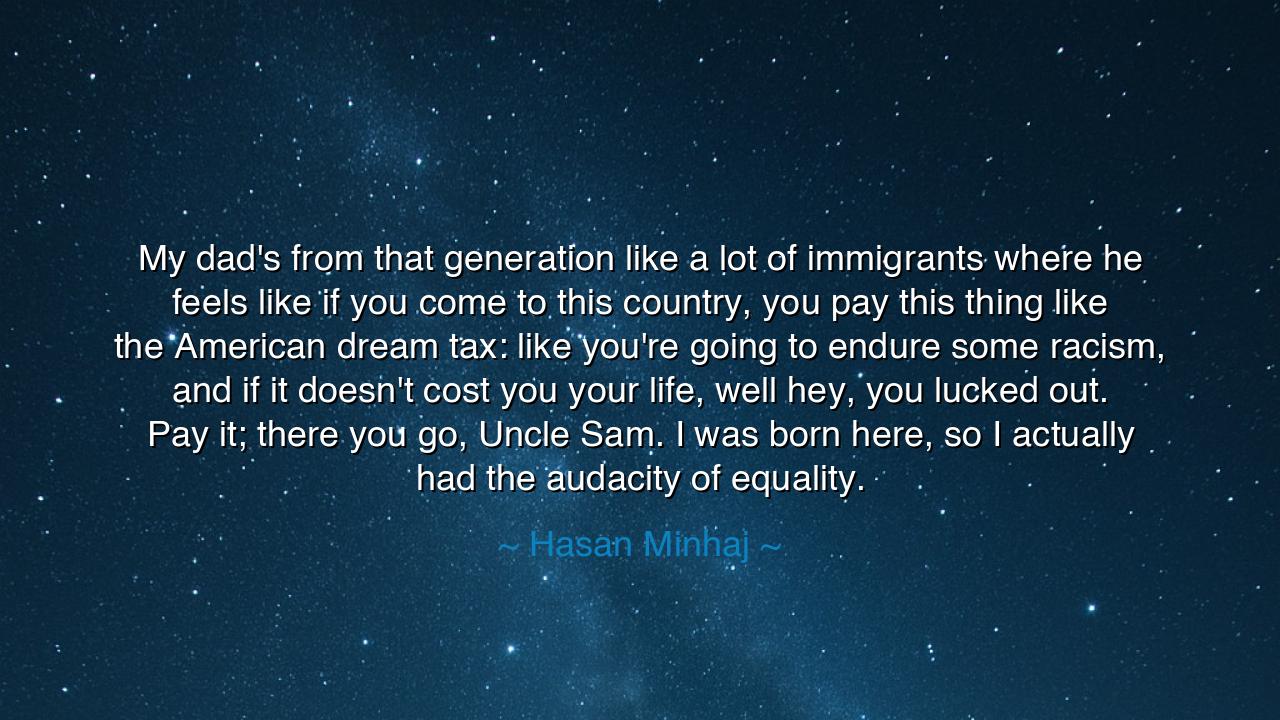
My dad's from that generation like a lot of immigrants where he
My dad's from that generation like a lot of immigrants where he feels like if you come to this country, you pay this thing like the American dream tax: like you're going to endure some racism, and if it doesn't cost you your life, well hey, you lucked out. Pay it; there you go, Uncle Sam. I was born here, so I actually had the audacity of equality.






“My dad's from that generation like a lot of immigrants where he feels like if you come to this country, you pay this thing like the American dream tax: like you're going to endure some racism, and if it doesn't cost you your life, well hey, you lucked out. Pay it; there you go, Uncle Sam. I was born here, so I actually had the audacity of equality.” Thus spoke Hasan Minhaj, a voice of wit and truth, a son of two worlds — one built through sacrifice, the other born into expectation. In his words resound the clash of generations, the echo of the immigrant’s humility meeting the native-born’s demand for justice. Beneath the humor lies a profound meditation on identity, dignity, and the evolution of courage within a family and a people.
The “American dream tax”, as Minhaj calls it, is not a literal toll, but a symbolic one — the price many immigrants pay to belong to a nation that promises equality but delivers it unevenly. His father, like countless others, came to a new land seeking opportunity, but also understanding that hardship, prejudice, and silent endurance would be his burden. To him, this was the cost of admission — the acceptance that progress comes with pain, that survival itself was victory. For the first generation, endurance was the highest virtue. To suffer quietly, to persevere with bowed head, was not weakness but wisdom — the way to protect one’s family in a land where the rules were not written in their favor.
Yet, as Minhaj declares, the son of that endurance is the voice of defiance. He was born not in exile but in citizenship; not as a guest, but as a rightful heir to the nation’s promises. What his father accepted as fate, he rejects as injustice. “I had the audacity of equality,” he says — and this is the generational shift that shapes every age. The child of struggle inherits not only the fruits of survival, but also the fire to demand more. For every people that has come to a new land — the Irish, the Italians, the Jews, the Indians, the Africans, and beyond — there comes this moment when the children say: We will no longer pay to be seen as human.
This tension is ancient. The first to arrive often carry the burden of silence. They bow to survive; they work in shadows, planting seeds for a harvest they may never see. But their children, standing upon that foundation, grow tall enough to face the sun. It was so with the slaves who built America’s wealth and whose descendants marched for civil rights. It was so with the immigrants who built the railroads, whose sons and daughters later walked into universities, courtrooms, and congress halls demanding equality. History, in its rhythm, always returns to this truth: what one generation endures, the next transforms.
Consider the example of Frederick Douglass, who was born into slavery but learned to read in defiance of law and custom. His mother’s generation could not imagine such rebellion — they fought simply to survive another day. But Douglass, having inherited their endurance, gave it voice, turning quiet suffering into a weapon of eloquence and courage. So too does Minhaj’s story fit within this timeless lineage: the son of the silent becomes the speaker of the unspoken, the one who transforms pain into protest, endurance into empowerment.
But Minhaj’s reflection is not merely about race or nationality — it is about human evolution through experience. Every family, every people, must wrestle with this inheritance: the balance between gratitude for what was gained and the demand for what is still owed. His father’s endurance and his own audacity are not opposites but complements — two halves of the same story. One built the bridge, the other dares to cross it. Without the father’s humility, the son’s courage might have no foundation; without the son’s boldness, the father’s sacrifice might have no legacy.
And so, my child, take this lesson to heart: honor the struggles of those who came before you, but do not let reverence become resignation. Gratitude is sacred, but silence is not. The world advances only when those who inherit freedom refuse to be content with half-measures of justice. If your parents bowed so you could stand, then stand tall. Speak truth, not in anger, but in remembrance — for every generation is both a continuation and a correction of the last. The “audacity of equality” is not arrogance; it is fulfillment of a promise written into the soul of every human being. Live, then, with both humility and courage: humility for the past that built you, and courage for the future that calls you to build anew.






AAdministratorAdministrator
Welcome, honored guests. Please leave a comment, we will respond soon